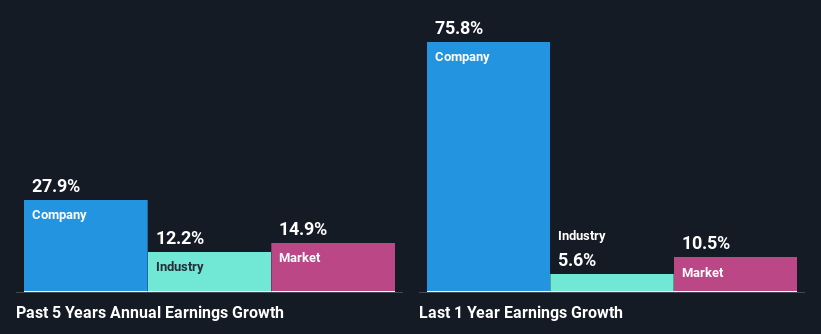Do Its Financials Have Any Role To Play In Driving International Human Resources Company's (TADAWUL:9545) Stock Up Recently?
International Human Resources (TADAWUL:9545) has had a great run on the share market with its stock up by a significant 23% over the last month. Given that stock prices are usually aligned with a company's financial performance in the long-term, we decided to study its financial indicators more closely to see if they had a hand to play in the recent price move. Specifically, we decided to study International Human Resources' ROE in this article.
ROE or return on equity is a useful tool to assess how effectively a company can generate returns on the investment it received from its shareholders. Simply put, it is used to assess the profitability of a company in relation to its equity capital.
Check out our latest analysis for International Human Resources
How Do You Calculate Return On Equity?
Return on equity can be calculated by using the formula:
Return on Equity = Net Profit (from continuing operations) ÷ Shareholders' Equity
So, based on the above formula, the ROE for International Human Resources is:
8.7% = ر.س3.9m ÷ ر.س45m (Based on the trailing twelve months to June 2024).
The 'return' refers to a company's earnings over the last year. So, this means that for every SAR1 of its shareholder's investments, the company generates a profit of SAR0.09.
What Has ROE Got To Do With Earnings Growth?
So far, we've learned that ROE is a measure of a company's profitability. Based on how much of its profits the company chooses to reinvest or "retain", we are then able to evaluate a company's future ability to generate profits. Assuming all else is equal, companies that have both a higher return on equity and higher profit retention are usually the ones that have a higher growth rate when compared to companies that don't have the same features.
International Human Resources' Earnings Growth And 8.7% ROE
As you can see, International Human Resources' ROE looks pretty weak. Not just that, even compared to the industry average of 25%, the company's ROE is entirely unremarkable. Despite this, surprisingly, International Human Resources saw an exceptional 28% net income growth over the past five years. We believe that there might be other aspects that are positively influencing the company's earnings growth. Such as - high earnings retention or an efficient management in place.
Next, on comparing with the industry net income growth, we found that International Human Resources' growth is quite high when compared to the industry average growth of 12% in the same period, which is great to see.

Earnings growth is a huge factor in stock valuation. The investor should try to establish if the expected growth or decline in earnings, whichever the case may be, is priced in. This then helps them determine if the stock is placed for a bright or bleak future. Is International Human Resources fairly valued compared to other companies? These 3 valuation measures might help you decide.
Is International Human Resources Efficiently Re-investing Its Profits?
International Human Resources' three-year median payout ratio is a pretty moderate 41%, meaning the company retains 59% of its income. By the looks of it, the dividend is well covered and International Human Resources is reinvesting its profits efficiently as evidenced by its exceptional growth which we discussed above.
While International Human Resources has been growing its earnings, it only recently started to pay dividends which likely means that the company decided to impress new and existing shareholders with a dividend.
Conclusion
In total, it does look like International Human Resources has some positive aspects to its business. Even in spite of the low rate of return, the company has posted impressive earnings growth as a result of reinvesting heavily into its business. While we won't completely dismiss the company, what we would do, is try to ascertain how risky the business is to make a more informed decision around the company. Our risks dashboard would have the 2 risks we have identified for International Human Resources.
Have feedback on this article? Concerned about the content? Get in touch with us directly. Alternatively, email editorial-team (at) simplywallst.com.
This article by Simply Wall St is general in nature. We provide commentary based on historical data and analyst forecasts only using an unbiased methodology and our articles are not intended to be financial advice. It does not constitute a recommendation to buy or sell any stock, and does not take account of your objectives, or your financial situation. We aim to bring you long-term focused analysis driven by fundamental data. Note that our analysis may not factor in the latest price-sensitive company announcements or qualitative material. Simply Wall St has no position in any stocks mentioned.
 Index Options
Index Options CME Group
CME Group Nasdaq
Nasdaq Cboe
Cboe TradingView
TradingView Wall Street Journal
Wall Street Journal